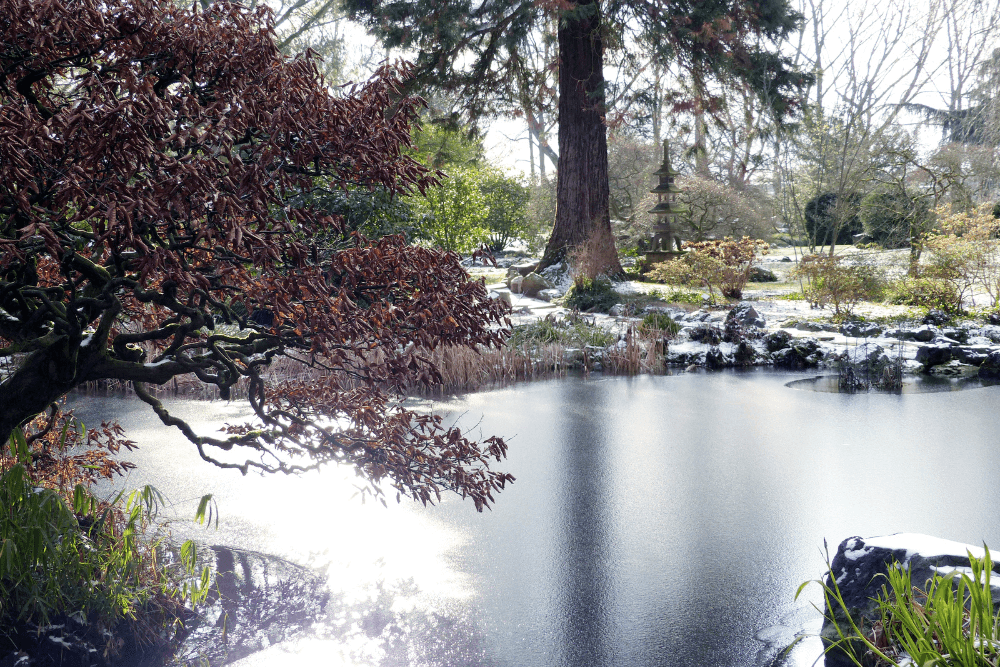Winter pond maintenance the do's and don'ts
Your garden pond maintenance checklist
Maintaining your garden pond is essential to ensure the health of aquatic life and the overall ecosystem. Winter pond maintenance may seem an obvious requirement that we don't need to be reminded about, but when it is cold and damp outdoors it is easy to 'turn a blind-eye' on taking care of our water feature. Just a few minutes a day or every other day can make a difference to a healthy pond and reducing the chances of algae taking hold. The size and location of a pond also impacts on how much time is needed to maintain your pond through the seasons. Besides, getting outdoors to get a few chores done is good for our own health and well-being!
Here are important steps to keep your pond healthy and thriving
- Do remove fallen debris - skim off fallen leaves and other debris that lands on the water surface. Keeping on top of this task is key to preventing excess organic matter decaying in your pond water.
- Do prune and cut-back aquatic plants - this will prevent over growth and casting too much shadow over your pond. Another important task especially if you are growing invasive species. By keeping on top of plant growth you will help maintain a balance in the ecosystem.
- Do monitor water quality - if you notice ice or snow build-up over an extended period preventing gas-exchange, clear an area using a de-icer, pond heater or hold a pot of hot water on the surface to melt the ice and allow sunlight through.
- Don't over feed your fish - if your pond is host to Koi or goldfish, reduce their feed as winter approaches and then stop feeding them when the temperature drops below 10 degrees Celsius. As the temperature gets colder, the metabolism of fish slows down and their ability to digest and process nutrients becomes impaired. When fish are fed in cold water, uneaten food accumulates at the bottom of the pond. This organic matter will start to decompose, releasing ammonia and other harmful substances into the water. Nitrifying bacteria that process ammonia into less toxic forms are also less active in the winter months. This many then lead to your fish becoming stressed leaving them more susceptible to diseases. Fish have a natural instinct to forage even in winter so they will find food if needed.
What happens when organic matter builds-up?
In short, a build-up of sludge (accumulation of organic and inorganic matter such as leaves, fish waste and uneaten fish food) will affect water quality and have a negative impact on the ecosystem. As the layer of sludge at the bottom of your pond builds up it starts to release nitrogen and phosphorus into the water. This then leads to an increase in nutrient levels which can result in excessive algae and aquatic plant growth. Too much algae will start to reduce clarity and may even give-off an unpleasant odour. Mats of algae blooms on the water surface also look unattractive. If left to continue growing, it will also lead to a depletion of oxygen in the water affecting the health of fish and aquatic life.
As organic matter starts to decompose, it consumes oxygen from the water which can stress and suffocate fish. In worst cases of sludge build-up the anaerobic condition can promote the growth of sulphate producing bacteria. They release foul smelling gases giving-off a pungent smell.
An accumulation of debris can also interfere with beneficial nitrifying bacteria that help convert harmful ammonia from fish waste into less toxic compounds.
Periodic removal of debris build-up at the bottom of your pond is important to maintain a healthy pond. The best time to do a pond clean is at the start of Spring as fish and aquatic life start becoming more energised.
Caring for your pond in winter helps to preserve the health of the aquatic ecosystem and ensure it will thrive when spring arrives. The specific amount of care your pond needs may also depend on its size, geographical and physical location and types of aquatic life it hosts. It is, therefore important to tailor your winter pond maintenance to the unique needs of your pond.
